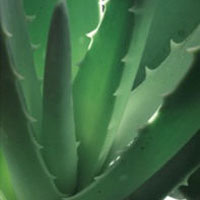Aloe
 © Steven Foster
© Steven FosterParts Used & Where Grown
The aloe plant originally came from Africa. The leaves, which are long, green, fleshy, and have spikes along the edges, are used medicinally. The fresh leaf gel and latex are used for many purposes. Aloe latex is the sticky residue left over after the liquid from cut aloe leaves has evaporated.
- Reliable and relatively consistent scientific data showing a substantial health benefit.
- Contradictory, insufficient, or preliminary studies suggesting a health benefit or minimal health benefit.
- For an herb, supported by traditional use but minimal or no scientific evidence. For a supplement, little scientific support.
Our proprietary “Star-Rating” system was developed to help you easily understand the amount of scientific support behind each supplement in relation to a specific health condition. While there is no way to predict whether a vitamin, mineral, or herb will successfully treat or prevent associated health conditions, our unique ratings tell you how well these supplements are understood by the medical community, and whether studies have found them to be effective for other people.
For over a decade, our team has combed through thousands of research articles published in reputable journals. To help you make educated decisions, and to better understand controversial or confusing supplements, our medical experts have digested the science into these three easy-to-follow ratings. We hope this provides you with a helpful resource to make informed decisions towards your health and well-being.
This supplement has been used in connection with the following health conditions:
| Used for | Amount | Why |
|---|---|---|
Burns | Apply gel three to five times per day | The herb Aloe vera is a popular remedy for minor burns, and a preliminary study found it more effective than Vaseline in treating burns.
|
Canker Sores | Follow label instructions | A gel containing the herbal Aloe vera polysaccharide acemannan may speed the healing of canker sores.
|
Constipation | Refer to label instructions | Aloe is considered a stimulant laxative because it stimulates bowel muscle contractions. Aloe is very potent and should be used with caution. |
Genital Herpes | Apply a 0.5% cream three times per day | One trial found that aloe cream shortened healing time of genital herpes outbreaks. |
Psoriasis | Apply a 0.5% extract three times daily | Topically applied aloe may improve skin-healing in people with psoriasis. |
Seborrheic Dermatitis | Apply a topical herbal cream containing 30% aloe emulsion | Topically applied aloe may help improve scaling and itching. |
Skin Ulcers | Apply gel on gauze or dressings daily | Aloe has been used historically to improve wound healing and studies have shown it to be effective in healing skin ulcers. |
Type 2 Diabetes | 100 to 300 mg daily | Aloe vera leaf gel may help lower blood glucose levels and hemoglobin-A1c, a marker of long-term glycemic control, in people with type 2 diabetes. |
Ulcerative Colitis | 100 ml of an Aloe vera herbal extract twice a day | Drinking aloe juice may improve your symptoms and your chances for remission. |
Wound Healing | Apply stabilized gel three to five times daily | Aloe has been shown to decrease inflammation, promote cellular repair, and facilitate wound healing. |
Crohn’s Disease | Refer to label instructions | Aloe juice has historically been recommended by doctors for people with Crohn’s disease. |
Gastroesophageal Reflux Disease | Refer to label instructions | Aloe is a soothing herb traditionally used to treat reflux and heartburn. |
Sunburn | Refer to label instructions | Topically applied Aloe vera is often recommended for soothing sunburn. |
Traditional Use (May Not Be Supported by Scientific Studies)
Aloe has been historically used for many of the same conditions for which it is used today—particularly constipation and minor cuts and burns. In India, it has been used by herbalists to treat intestinal infections, suppressed menses, and colic.
Copyright © 2026 TraceGains, Inc. All rights reserved.
Learn more about TraceGains, the company.
The information presented by TraceGains is for informational purposes only. It is based on scientific studies (human, animal, or in vitro), clinical experience, or traditional usage as cited in each article. The results reported may not necessarily occur in all individuals. Self-treatment is not recommended for life-threatening conditions that require medical treatment under a doctor's care. For many of the conditions discussed, treatment with prescription or over the counter medication is also available. Consult your doctor, practitioner, and/or pharmacist for any health problem and before using any supplements or before making any changes in prescribed medications. Information expires December 2026.













